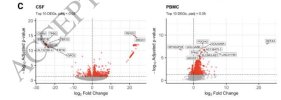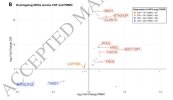CSF immune cell alterations in women with neuropsychiatric Long COVID
BACKGROUND
Women are disproportionately affected by neuropsychiatric symptoms following recovery from acute COVID-19. However, whether there are central nervous system-specific changes in gene expression in women with neuropsychiatric Long COVID (NP-Long COVID) remains unknown.
METHODS
Twenty-two women with and ten women without NP-Long COVID were enrolled from New Haven, CT, and the surrounding region and consented to a blood draw and large volume lumbar puncture. Total RNA was extracted from cerebrospinal fluid (CSF) cells and peripheral blood mononuclear cells (PBMC). Polyadenylated RNA was sequenced, and differential expression analyses were performed.
RESULTS
Both CSF and PBMC samples showed differential gene expression associated with Long COVID status. There were CSF-specific differentially expressed genes (DEGs) in people with Long COVID, including in genes related to oxidative stress, reactive oxygen species, and P53 response, indicating compartment-specific immune responses. Some pathways were dysregulated in both the CSF and PBMC of Long COVID compared to controls, including those related to androgen response, MTORC1 signaling, and lipid metabolism.
CONCLUSIONS
Women with NP-long COVID show compartment-specific, transcriptional profiles in the CSF with evidence of enrichment in cellular stress pathways. These results underscore the importance of examining CSF-specific molecular profiles to better understand post-viral neurological syndromes.
Web | PDF | The Journal of Infectious Diseases | Open Access
Orlinick, Benjamin; Mehta, Sameet; McAlpine, Lindsay; Khoshbakht, Saba; Fertuzinhos, Sofia; Nelson, Allison; Chiarella, Jennifer; Das, Bibhuprasad; Patel, Vansh; Filippidis, Paraskevas; Corley, Michael J; Spudich, Serena S; Farhadian, Shelli F
BACKGROUND
Women are disproportionately affected by neuropsychiatric symptoms following recovery from acute COVID-19. However, whether there are central nervous system-specific changes in gene expression in women with neuropsychiatric Long COVID (NP-Long COVID) remains unknown.
METHODS
Twenty-two women with and ten women without NP-Long COVID were enrolled from New Haven, CT, and the surrounding region and consented to a blood draw and large volume lumbar puncture. Total RNA was extracted from cerebrospinal fluid (CSF) cells and peripheral blood mononuclear cells (PBMC). Polyadenylated RNA was sequenced, and differential expression analyses were performed.
RESULTS
Both CSF and PBMC samples showed differential gene expression associated with Long COVID status. There were CSF-specific differentially expressed genes (DEGs) in people with Long COVID, including in genes related to oxidative stress, reactive oxygen species, and P53 response, indicating compartment-specific immune responses. Some pathways were dysregulated in both the CSF and PBMC of Long COVID compared to controls, including those related to androgen response, MTORC1 signaling, and lipid metabolism.
CONCLUSIONS
Women with NP-long COVID show compartment-specific, transcriptional profiles in the CSF with evidence of enrichment in cellular stress pathways. These results underscore the importance of examining CSF-specific molecular profiles to better understand post-viral neurological syndromes.
Web | PDF | The Journal of Infectious Diseases | Open Access



